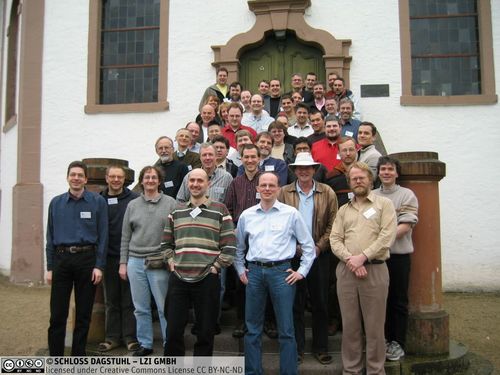Dagstuhl-Seminar 05161
Transformation Techniques in Software Engineering
( 17. Apr – 22. Apr, 2005 )
Permalink
Organisatoren
- James R. Cordy (Queen's University - Kingston, CA)
- Ralf Lämmel (Microsoft Research - Redmond, US)
- Andreas Winter (Universität Koblenz-Landau, DE)
Kontakt
Externe Veranstaltungsseite
The idea for this seminar began with the observation of a discrepancy:
- While software transformation is a crosscutting theme in
software engineering, the various fields in which it is used are only
passingly aware of each other.
It would therefore make sense to bring together leading representatives from the different fields so that they can share problems and solutions related to their use of transformations and begin a dialogue on understanding transformation itself as a whole. Without claiming completeness, the following (somewhat overlapping) communities can be identified:
- Program calculation
- Language implementation
- Model-driven development
- Grammar(ware) engineering
- Modelling and meta-modelling
- Generative software development
- Code restructuring and refactoring
- Database reverse and re-engineering
- Co-evolving designs and implementations
- Data integration incl. semi-structured data
- Design recovery and architectural recovery
- Intentional and aspect-oriented programming
Most of these communities know of more than one kind of transformations. Also, transformation techniques are not always tied to a specific community. So it makes sense to abstract a little from the communities, and to identify some of the dimensions of variation for transformation techniques.
- The kind of grammars or schemas involved.
- The degree of automation of transformations.
- The degree of interactive transformations.
- The degree of formalisation of transformations.
- The degree of programming language support.
- The computational framework for transformations.
- The nature of transformation properties.
- The kinds of artifact: programs, data, and schemas.
- and so on.
During a week of intensive discussion, 47 participants from 12 countries attended the seminar, contributed presentations and participated in and/or organised discussion groups and panels. (International statistics for participants: Germany (14), Canada (12), U.S.A. (5), Belgium (4), the Netherlands (3), France (2), United Kingdom (2), Hungary (1), Ireland (1), Italy (1), Japan (1) and Switzerland (1).)
- Don Batory (University of Texas - Austin, US) [dblp]
- Jean Bezivin (University of Nantes, FR) [dblp]
- James R. Cordy (Queen's University - Kingston, CA) [dblp]
- Krzysztof Czarnecki (University of Waterloo, CA) [dblp]
- Thomas R. Dean (Kingston University - Kingston upon Thames, GB)
- Birgit Demuth (TU Dresden, DE)
- Jürgen Doser (ETH Zürich, CH)
- Mohammad El-Ramly (University of Leicester, GB)
- Jean-Marie Favre (LSR - IMAG, FR) [dblp]
- Rudolf Ferenc (University of Szeged, HU)
- Michael W. Godfrey (University of Waterloo, CA) [dblp]
- Martin Gogolla (Universität Bremen, DE) [dblp]
- Robert Hirschfeld (DOCOMO Euro-Labs - München, DE) [dblp]
- Richard C. Holt (University of Waterloo, CA)
- Nigel Horspool (University of Victoria, CA)
- Hans-Arno Jacobsen (University of Toronto, CA) [dblp]
- Dean Jin (University of Manitoba - Winnipeg, CA)
- Holger M. Kienle (University of Victoria, CA)
- Raimund Klein (Universität Bremen, DE)
- Günter Kniesel (Universität Bonn, DE)
- Shriram Krishnamurthi (Brown University - Providence, US) [dblp]
- Ralf Lämmel (Microsoft Research - Redmond, US) [dblp]
- Brian A. Malloy (Clemson University, US)
- Andrew Malton (University of Waterloo, CA)
- Kim Mens (University of Louvain, BE) [dblp]
- Tom Mens (University of Mons, BE) [dblp]
- Shin-Cheng Mu (University of Tokyo, JP)
- Hausi A. Müller (University of Victoria, CA) [dblp]
- Alberto Pettorossi (University of Rome "Tor Vergata", IT)
- Markus Pizka (TU München, DE)
- James Power (NUI Maynooth, IE)
- Volker Riediger (Universität Koblenz-Landau, DE)
- Tobias Rötschke (TU Darmstadt, DE)
- Bernhard Rumpe (TU Braunschweig, DE) [dblp]
- Andy Schürr (TU Darmstadt, DE) [dblp]
- Steffen Staab (Universität Koblenz-Landau, DE) [dblp]
- Gabriele Taentzer (TU Berlin, DE) [dblp]
- Simon J. Thompson (University of Kent, GB) [dblp]
- Mark van den Brand (CWI - Amsterdam, NL) [dblp]
- Pieter Van Gorp (University of Antwerp, BE) [dblp]
- Jurgen J. Vinju (CWI - Amsterdam, NL) [dblp]
- Eelco Visser (Utrecht University, NL) [dblp]
- Jens Holger Weber (University of Victoria, CA) [dblp]
- David Wile (Teknowledge Corporation -Marina Del Rey, US)
- Andreas Winter (Universität Koblenz-Landau, DE)
- Roel Wuyts (Free University of Brussels, BE)
- Albert Zündorf (Universität Kassel, DE) [dblp]


